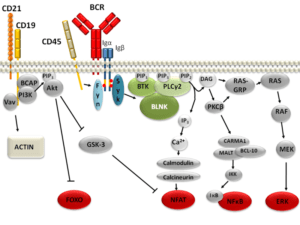B cells are not only important for producing antibodies but they also aid the T cell arm of the immune response by antigen presentation. This study showed that B cells in individuals with tuberculosis (TB) infection had less B cells in circulation and the B cells which were present were mostly dysfunctional. However, upon TB treatment, the B cells regained regular function.
B cells have various functions including antigen presentation, cytokine production, co-stimulatory signalling as well as a role in immunoregulation. B cells have been less studied in TB disease as the bacterium has been shown to elicit a strong innate and T cell response. Studies have produced different results in regards to the role of B cells in TB disease. For example, some studies have shown that the frequencies of B cells in active TB are decreased, another study says the frequency increases while yet another says the B cells are left unchanged.
Researchers, led by Tom Ottenhoff, therefore investigated what role B cells have in TB infection and whether the B cells are affected by the presence of the bacteria. They took blood samples from patients at different stages of TB infection: latently infected, actively infected, people who were successful cured from TB infection and uninfected controls. They also obtained lung samples from deceased TB patients.
Interestingly, the researchers found that the individuals with active TB had B cells with substantially reduced function as opposed to the controls. This B cell impairment was also observed for individuals who had latent TB infected. The main B cells dysfunctions were shown to be decreased proliferation and less antibody and cytokine production. The data also showed that the B cells returned to normal function upon successful treatment of the TB infection.
This study shows that B cell functions are substantially affected by TB infection and highlights an important role for B cells in TB disease. Dysfunctional B cells cannot adequately present antigens to T cells which may aid in the survival of the bacteria.
Article by Thandeka Moyo












